Unit8 Our Clothes单元复习学案(附答案)
文档属性
| 名称 | Unit8 Our Clothes单元复习学案(附答案) |
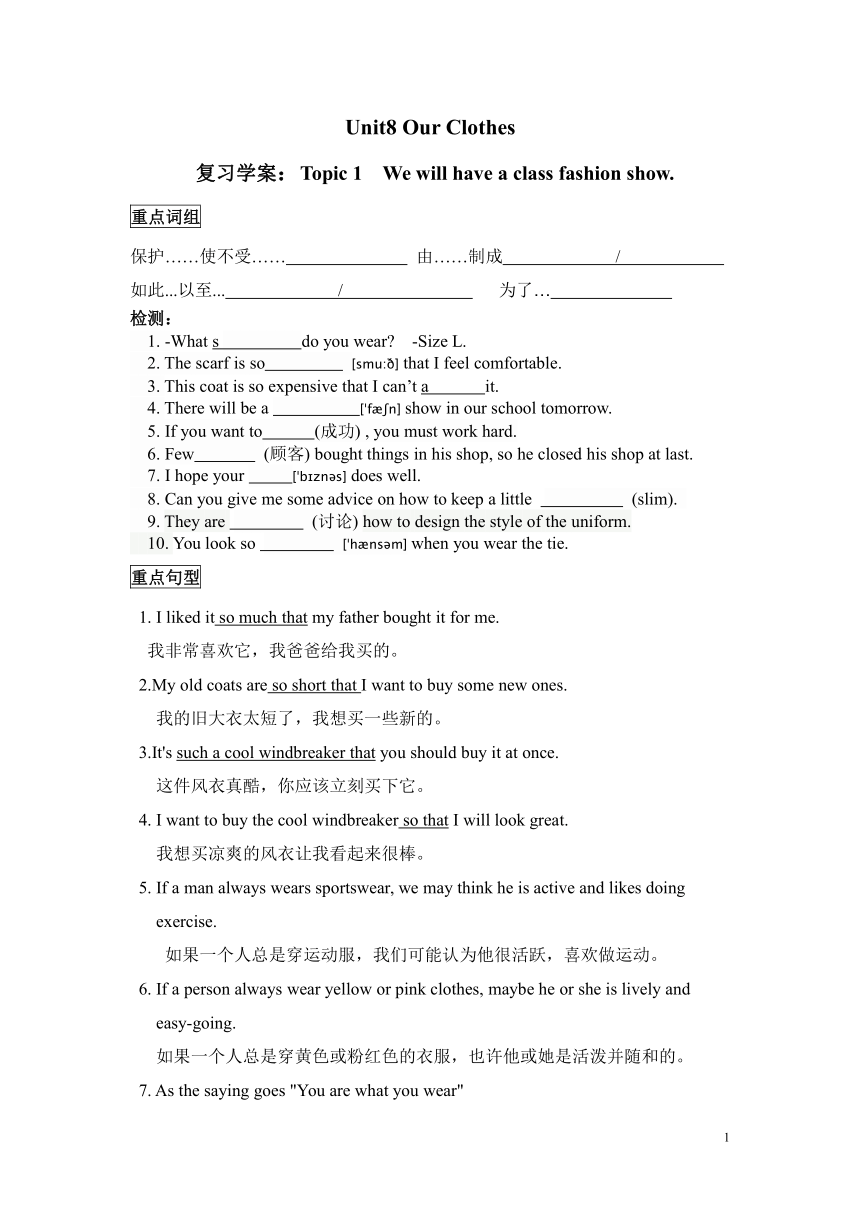
|
|
| 格式 | zip | ||
| 文件大小 | 157.0KB | ||
| 资源类型 | 试卷 | ||
| 版本资源 | 仁爱科普版 | ||
| 科目 | 英语 | ||
| 更新时间 | 2020-06-02 00:00:00 | ||
图片预览

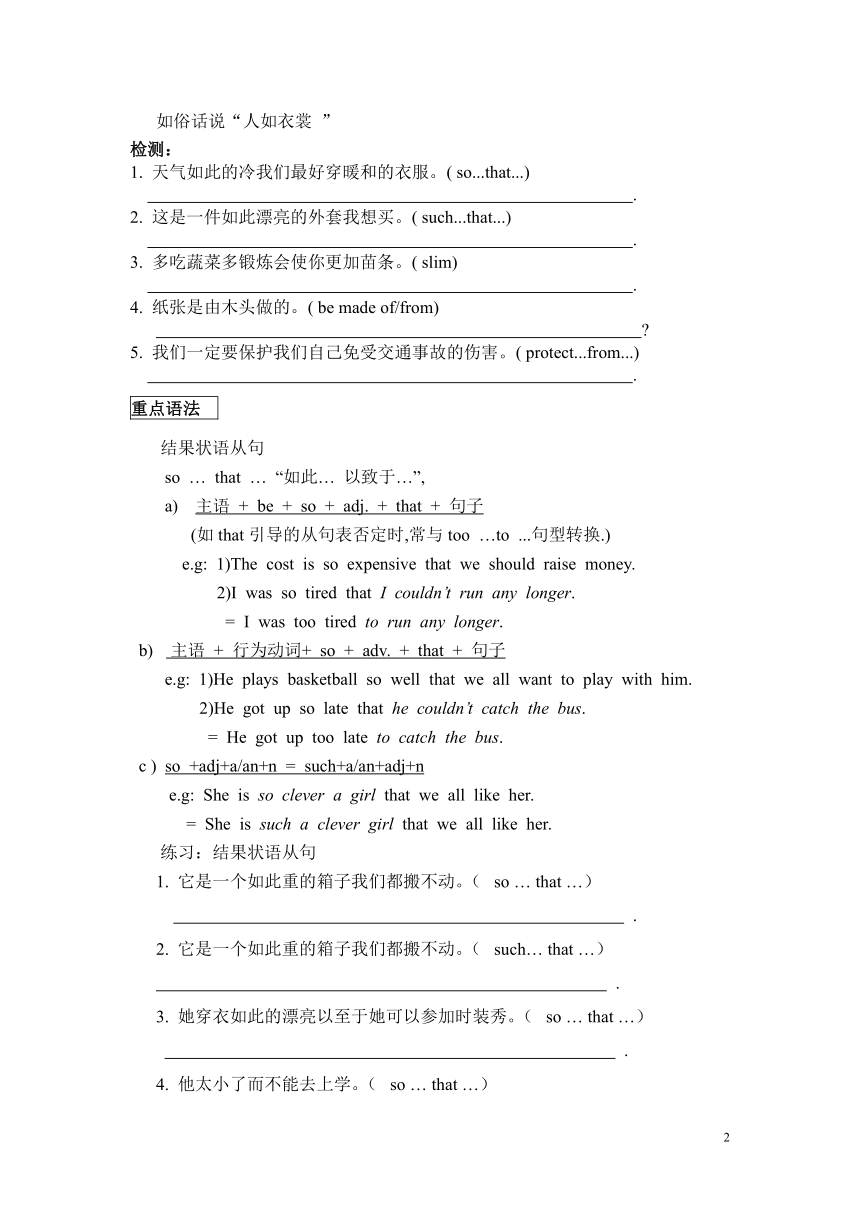
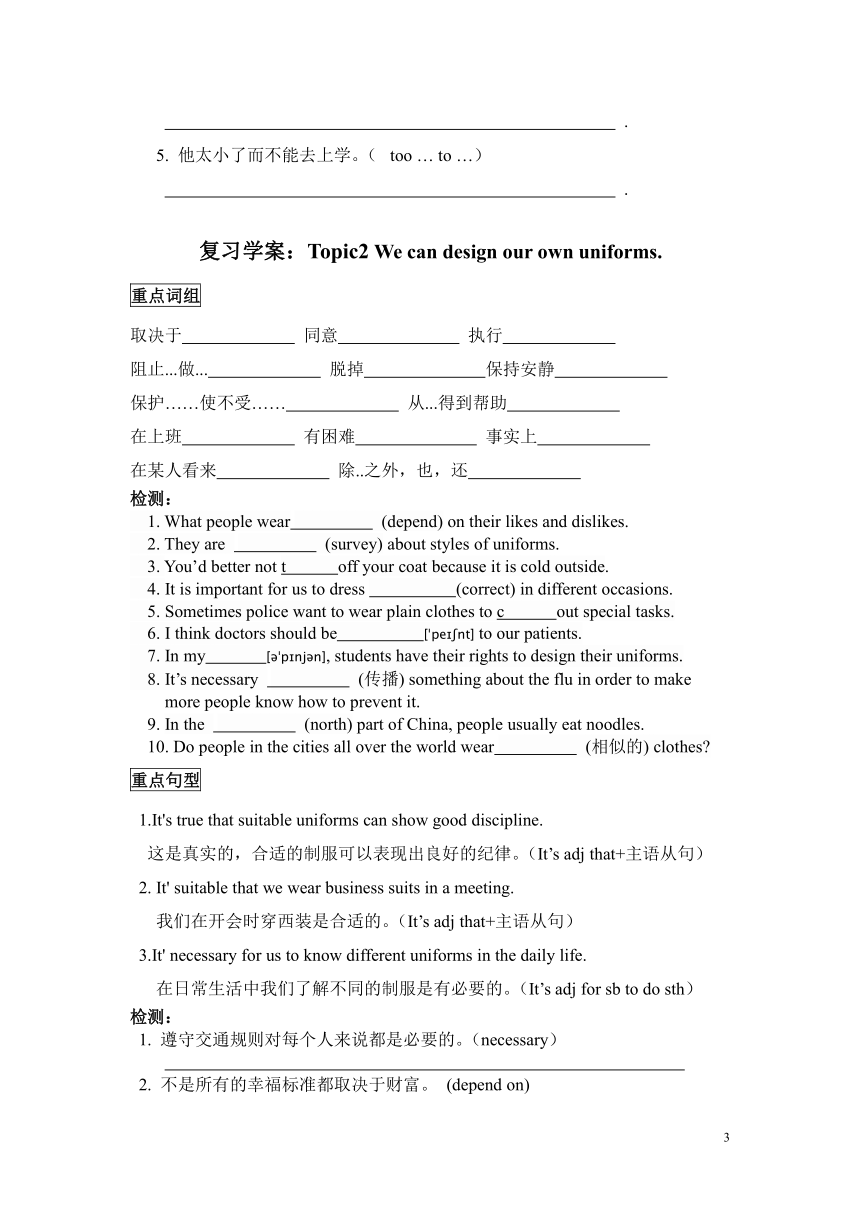
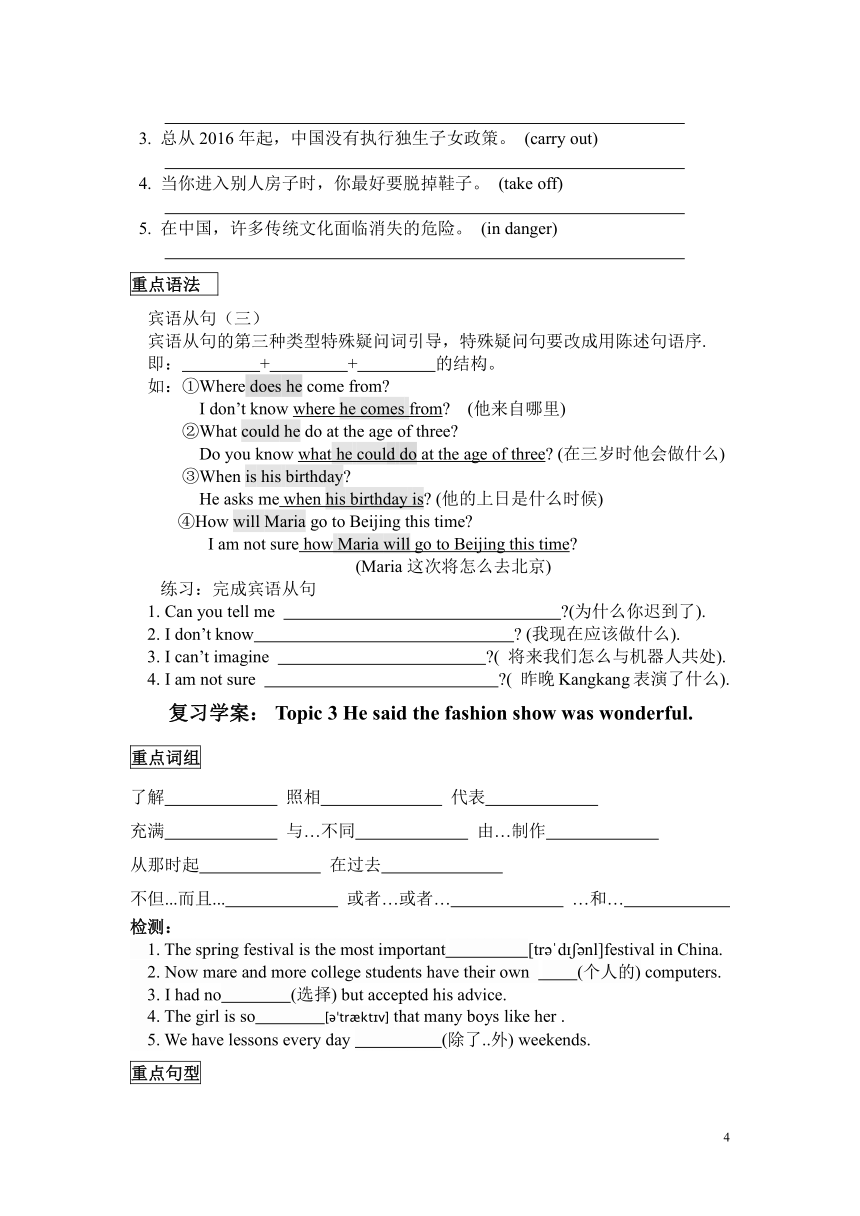
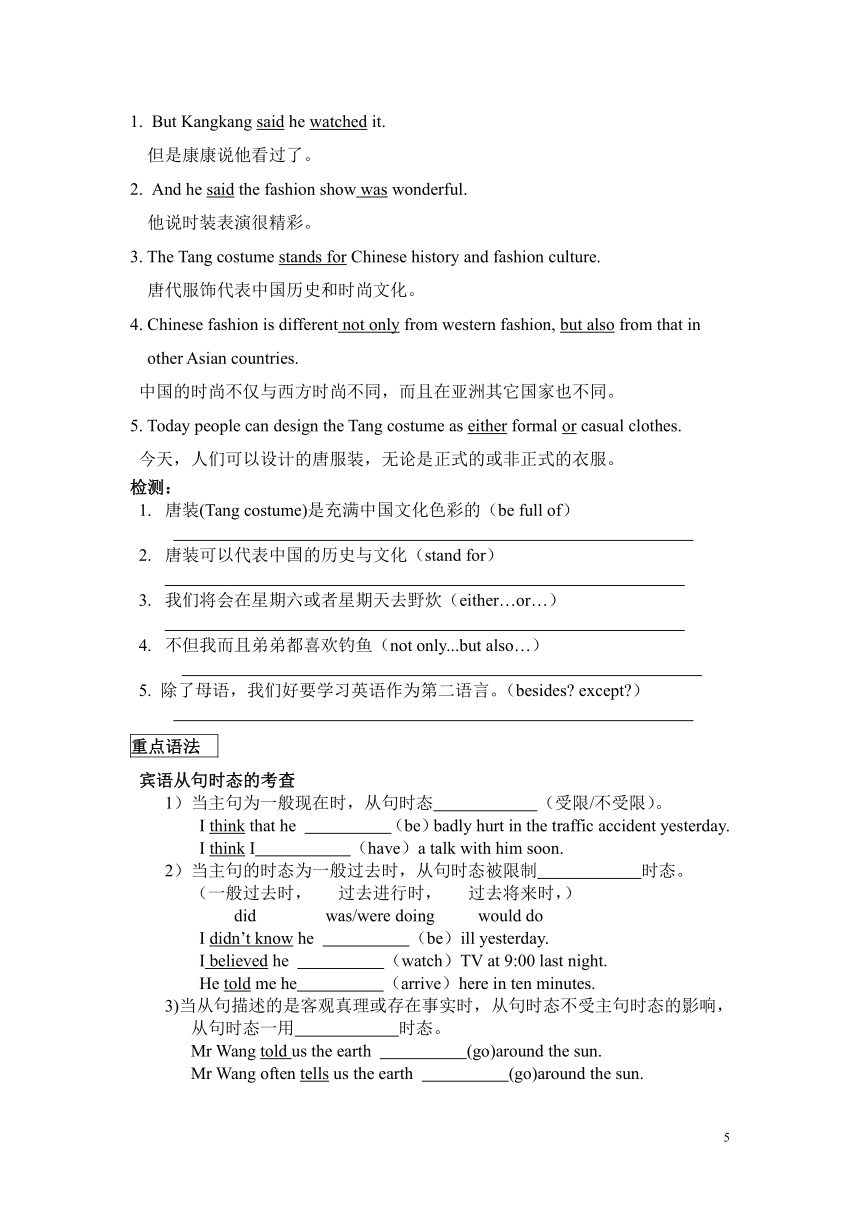
文档简介
Unit8
Our
Clothes
复习学案:Topic
1
We
will
have
a
class
fashion
show.
重点词组
保护……使不受……
由……制成
/
如此...以至...
/
为了…
检测:
1.
-What
s?
do
you
wear?
-Size
L.
2.
The
scarf
is
so
[smu:?]
that
I
feel
comfortable.
3.
This
coat
is
so
expensive
that
I
can’t
a
?
it.
4.
There
will
be
a?
[?f??n]
show
in
our
school
tomorrow.
5.
If
you
want
to
(成功)
,
you
must
work
hard.
6.
Few
(顾客)
bought
things
in
his
shop,
so
he
closed
his
shop
at
last.
7.
I
hope
your?
[?b?zn?s]?does
well.
8.
Can
you
give
me
some
advice
on
how
to
keep
a
little
?
(slim).
9.
They
are??
(讨论)
how
to
design
the
style
of
the
uniform.
10.
You
look
so??
[?h?ns?m]
when
you
wear
the
tie.
重点句型
1.
I
liked
it
so
much
that
my
father
bought
it
for
me.
我非常喜欢它,我爸爸给我买的。
2.My
old
coats
are
so
short
that
I
want
to
buy
some
new
ones.
我的旧大衣太短了,我想买一些新的。
3.It's
such
a
cool
windbreaker
that
you
should
buy
it
at
once.
这件风衣真酷,你应该立刻买下它。
4.
I
want
to
buy
the
cool
windbreaker
so
that
I
will
look
great.
我想买凉爽的风衣让我看起来很棒。
5.
If
a
man
always
wears
sportswear,
we
may
think
he
is
active
and
likes
doing
exercise.
如果一个人总是穿运动服,我们可能认为他很活跃,喜欢做运动。
6.
If
a
person
always
wear
yellow
or
pink
clothes,
maybe
he
or
she
is
lively
and
easy-going.
如果一个人总是穿黄色或粉红色的衣服,也许他或她是活泼并随和的。
7.
As
the
saying
goes
"You
are
what
you
wear"
如俗话说“人如衣裳
”
检测:
1.
天气如此的冷我们最好穿暖和的衣服。(
so...that...)
.
2.
这是一件如此漂亮的外套我想买。(
such...that...)
.
3.
多吃蔬菜多锻炼会使你更加苗条。(
slim)
.
4.
纸张是由木头做的。(
be
made
of/from)
?
5.
我们一定要保护我们自己免受交通事故的伤害。(
protect...from...)
.
重点语法
结果状语从句
?so
…
that
…
“如此…
以致于…”,
a)????主语
+
be
+
so
+
adj.
+
that
+
句子
(如that引导的从句表否定时,常与too
…to
...句型转换.)
e.g:
1)The
cost
is
so
expensive
that
we
should
raise
money.
2)I
was
so
tired
that
I
couldn’t
run
any
longer.
=
I
was
too
tired
to
run
any
longer.
b)????主语
+
行为动词+
so
+
adv.
+
that
+
句子
e.g:
1)He
plays
basketball
so
well
that
we
all
want
to
play
with
him.
2)He
got
up
so
late
that
he
couldn’t
catch
the
bus.
=
He
got
up
too
late
to
catch
the
bus.
c?)
so
+adj+a/an+n
=
such+a/an+adj+n
e.g:
She
is
so
clever
a
girl
that
we
all
like
her.
=
She
is
such
a
clever
girl
that
we
all
like
her.
练习:结果状语从句
1.
它是一个如此重的箱子我们都搬不动。(???so
…
that
…)
.
2.
它是一个如此重的箱子我们都搬不动。(???such…
that
…)
.
3.
她穿衣如此的漂亮以至于她可以参加时装秀。(???so
…
that
…)
.
4.
他太小了而不能去上学。(???so
…
that
…)
.
5.
他太小了而不能去上学。(???too
…
to
…)
.
复习学案:Topic2
We
can
design
our
own
uniforms.
重点词组
取决于
同意
执行
阻止...做...
脱掉
保持安静
保护……使不受……
从...得到帮助
在上班
有困难
事实上
在某人看来
除..之外,也,还
检测:
1.
What
people
wear?
(depend)
on
their
likes
and
dislikes.
2.
They
are
?
(survey)
about
styles
of
uniforms.
3.
You’d
better
not?t
off
your
coat
because
it
is
cold
outside.
4.
It
is
important
for
us
to
dress?
(correct)
in
different
occasions.
5.
Sometimes
police
want
to
wear
plain
clothes
to
c
out
special
tasks.
6.
I
think
doctors
should
be
[?pe??nt]
to
our
patients.
7.
In
my
[??p?nj?n],
students
have
their
rights
to
design
their
uniforms.
8.
It’s
necessary
?
(传播)
something
about
the
flu
in
order
to
make
more
people
know
how
to
prevent
it.
9.
In
the
?
(north)
part
of
China,
people
usually
eat
noodles.
10.
Do
people
in
the
cities
all
over
the
world
wear?
(相似的)
clothes?
重点句型
1.It's
true
that
suitable
uniforms
can
show
good
discipline.
这是真实的,合适的制服可以表现出良好的纪律。(It’s
adj
that+主语从句)
2.
It'
suitable
that
we
wear
business
suits
in
a
meeting.
我们在开会时穿西装是合适的。(It’s
adj
that+主语从句)
3.It'
necessary
for
us
to
know
different
uniforms
in
the
daily
life.
在日常生活中我们了解不同的制服是有必要的。(It’s
adj
for
sb
to
do
sth)
检测:
1.
遵守交通规则对每个人来说都是必要的。(necessary)
2.
不是所有的幸福标准都取决于财富。
(depend
on)
3.
总从2016年起,中国没有执行独生子女政策。
(carry
out)
4.
当你进入别人房子时,你最好要脱掉鞋子。
(take
off)
5.
在中国,许多传统文化面临消失的危险。
(in
danger)
重点语法
宾语从句(三)
宾语从句的第三种类型特殊疑问词引导,特殊疑问句要改成用陈述句语序.
即:
+
+
的结构。
如:①Where
does
he
come
from?
I
don’t
know
where
he
comes
from?
(他来自哪里)
②What
could
he
do
at
the
age
of
three?
Do
you
know
what
he
could
do
at
the
age
of
three?
(在三岁时他会做什么)
③When
is
his
birthday?
He
asks
me
when
his
birthday
is?
(他的上日是什么时候)
④How
will
Maria
go
to
Beijing
this
time?
I
am
not
sure
how
Maria
will
go
to
Beijing
this
time?
(Maria这次将怎么去北京)
练习:完成宾语从句
1.
Can
you
tell
me
?(为什么你迟到了).
2.
I
don’t
know
?
(我现在应该做什么).
3.
I
can’t
imagine
?(
将来我们怎么与机器人共处).
4.
I
am
not
sure
?(
昨晚Kangkang表演了什么).
复习学案:?Topic
3
He
said
the
fashion
show
was
wonderful.
重点词组
了解
照相
代表
充满
与…不同
由…制作
从那时起
在过去
不但...而且...
或者…或者…
…和…
检测:
1.
The
spring
festival
is
the
most
important?
[tr??d???nl]festival
in
China.
2.
Now
mare
and
more
college
students
have
their
own
?
(个人的)
computers.
3.
I
had
no
(选择)
but
accepted
his
advice.
4.
The
girl
is
so
[??tr?kt?v]
that
many
boys
like
her
.
5.
We
have
lessons
every
day?
(除了..外)
weekends.
重点句型
But
Kangkang
said
he
watched
it.
但是康康说他看过了。
And
he
said
the
fashion
show
was
wonderful.
他说时装表演很精彩。
3.
The
Tang
costume
stands
for
Chinese
history
and
fashion
culture.
唐代服饰代表中国历史和时尚文化。
4.
Chinese
fashion
is
different
not
only
from
western
fashion,
but
also
from
that
in
other
Asian
countries.
中国的时尚不仅与西方时尚不同,而且在亚洲其它国家也不同。
5.
Today
people
can
design
the
Tang
costume
as
either
formal
or
casual
clothes.
今天,人们可以设计的唐服装,无论是正式的或非正式的衣服。
检测:
唐装(Tang
costume)是充满中国文化色彩的(be
full
of)
唐装可以代表中国的历史与文化(stand
for)
我们将会在星期六或者星期天去野炊(either…or…)
不但我而且弟弟都喜欢钓鱼(not
only...but
also…)
5.
除了母语,我们好要学习英语作为第二语言。(besides?
except?)
重点语法
宾语从句时态的考查
1)当主句为一般现在时,从句时态
(受限/不受限)。
I
think
that
he
(be)badly
hurt
in
the
traffic
accident
yesterday.
I
think
I
(have)a
talk
with
him
soon.
2)当主句的时态为一般过去时,从句时态被限制
时态。
(一般过去时,
过去进行时,
过去将来时,)
did
was/were
doing
would
do
I
didn’t
know
he
(be)ill
yesterday.
I
believed
he
(watch)TV
at
9:00
last
night.
He
told
me
he
(arrive)here
in
ten
minutes.
3)当从句描述的是客观真理或存在事实时,从句时态不受主句时态的影响,从句时态一用
时态。
Mr
Wang
told
us
the
earth
(go)around
the
sun.
Mr
Wang
often
tells
us
the
earth
(go)around
the
sun.
Unit8
Our
Clothes
复习学案:Topic
1
We
will
have
a
class
fashion
show.
重点词组
保护……使不受……protect...from...
由……制成be
made
of/be
made
from
如此...以至...so...that.../such...that
为了…in
order
to
检测:
1.
-What
size
do
you
wear?
-Size
L.
2.
The
scarf
is
so
smooth
[smu:?]
that
I
feel
comfortable.
3.
This
coat
is
so
expensive
that
I
can’t
afford
it.
4.
There
will
be
a?fashion
[?f??n]
show
in
our
school
tomorrow.
5.
If
you
want
to
succeed
(成功)
,
you
must
work
hard.
6.
Few
customers
(顾客)
bought
things
in
his
shop,
so
he
closed
his
shop
at
last.
7.
I
hope
your?business
[?b?zn?s]?does
well.
8.
Can
you
give
me
some
advice
on
how
to
keep
a
little
slimmer
(slim).
9.
They
are?discussing
(讨论)
how
to
design
the
style
of
the
uniform.
10.
You
look
so?handsome
[?h?ns?m]
when
you
wear
the
tie.
重点句型
1.
I
liked
it
so
much
that
my
father
bought
it
for
me.
我非常喜欢它,我爸爸给我买的。
2.My
old
coats
are
so
short
that
I
want
to
buy
some
new
ones.
我的旧大衣太短了,我想买一些新的。
3.It's
such
a
cool
windbreaker
that
you
should
buy
it
at
once.
这件风衣真酷,你应该立刻买下它。
4.
I
want
to
buy
the
cool
windbreaker
so
that
I
will
look
great.
我想买凉爽的风衣让我看起来很棒。
5.
If
a
man
always
wears
sportswear,
we
may
think
he
is
active
and
likes
doing
exercise.
如果一个人总是穿运动服,我们可能认为他很活跃,喜欢做运动。
6.
If
a
person
always
wear
yellow
or
pink
clothes,
maybe
he
or
she
is
lively
and
easy-going.
如果一个人总是穿黄色或粉红色的衣服,也许他或她是活泼并随和的。
7.
As
the
saying
goes
"You
are
what
you
wear"
如俗话说“人如衣裳
”
检测:
1.
天气如此的冷我们最好穿暖和的衣服。(
so...that...)
It's
so
cold
that
we'd
better
wear
warm
clothes.
2.
这是一件如此漂亮的外套我想买。(
such...that...)
This
is
such
a
beautiful
coat
I
want
to
buy.
3.
多吃蔬菜多锻炼会使你更加苗条。(
slim)
Eating
more
vegetables
and
exercising
more
will
make
you
slimmer.
4.
纸张是由木头做的。(
be
made
of/from)
Paper
is
made
of
wood.
5.
我们一定要保护我们自己免受交通事故的伤害。(
protect...from...)
We
must
protect
ourselves
from
traffic
accidents.
重点语法
结果状语从句
?so
…
that
…
“如此…
以致于…”,
a)????主语
+
be
+
so
+
adj.
+
that
+
句子
(如that引导的从句表否定时,常与too
…to
...句型转换.)
e.g:
1)The
cost
is
so
expensive
that
we
should
raise
money.
2)I
was
so
tired
that
I
couldn’t
run
any
longer.
=
I
was
too
tired
to
run
any
longer.
b)????主语
+
行为动词+
so
+
adv.
+
that
+
句子
e.g:
1)He
plays
basketball
so
well
that
we
all
want
to
play
with
him.
2)He
got
up
so
late
that
he
couldn’t
catch
the
bus.
=
He
got
up
too
late
to
catch
the
bus.
c?)
so
+adj+a/an+n
=
such+a/an+adj+n
e.g:
She
is
so
clever
a
girl
that
we
all
like
her.
=
She
is
such
a
clever
girl
that
we
all
like
her.
练习:结果状语从句
1.
它是一个如此重的箱子我们都搬不动。(???so
…
that
…)
It's
so
heavy
a
box
that
we
can't
move
it.
.
2.
它是一个如此重的箱子我们都搬不动。(???such…
that
…)
It's
such
a
heavy
box
that
we
can't
move
it
.
3.
她穿衣如此的漂亮以至于她可以参加时装秀。(???so
…
that
…)
She
dresses
so
beautifully
that
she
can
go
to
the
fashion
show..
4.
他太小了而不能去上学。(???so
…
that
…)
He
is
so
young
that
he
can’t
go
to
school.
5.
他太小了而不能去上学。(???too
…
to
…)
He
is
too
young
to
go
to
school
.
复习学案:Topic2
We
can
design
our
own
uniforms.
重点词组
取决于depend
on
同意agree
with
执行carry
out
阻止...做...stop...from...
脱掉take
off保持安静keep
quiet
保护……使不受……protect...from...
从...得到帮助get
help
from...
在上班at
work
有困难in
trouble
事实上in
fact
在某人看来in
one’s
opinion
除..之外,也,还as
well
as
检测:
1.
What
people
wear
depends
(depend)
on
their
likes
and
dislikes.
2.
They
are
surveying
(survey)
about
styles
of
uniforms.
3.
You’d
better
not?take
off
your
coat
because
it
is
cold
outside.
4.
It
is
important
for
us
to
dress?correctly
(correct)
in
different
occasions.
5.
Sometimes
police
want
to
wear
plain
clothes
to
carry
out
special
tasks.
6.
I
think
doctors
should
be
patient
[?pe??nt]
to
our
patients.
7.
In
my
opinion
[??p?nj?n],
students
have
their
rights
to
design
their
uniforms.
8.
It’s
necessary
to
spread
(传播)
something
about
the
flu
in
order
to
make
more
people
know
how
to
prevent
it.
9.
In
the
northern
(north)
part
of
China,
people
usually
eat
noodles.
10.
Do
people
in
the
cities
all
over
the
world
wear
similar
(相似的)
clothes?
重点句型
1.It's
true
that
suitable
uniforms
can
show
good
discipline.
这是真实的,合适的制服可以表现出良好的纪律。(It’s
adj
that+主语从句)
2.
It'
suitable
that
we
wear
business
suits
in
a
meeting.
我们在开会时穿西装是合适的。(It’s
adj
that+主语从句)
3.It'
necessary
for
us
to
know
different
uniforms
in
the
daily
life.
在日常生活中我们了解不同的制服是有必要的。(It’s
adj
for
sb
to
do
sth)
检测:
1.
遵守交通规则对每个人来说都是必要的。(necessary)
It
is
necessary
for
everyone
to
obey
the
traffic
rules.
2.
不是所有的幸福标准都取决于财富。
(depend
on)
Not
all
happiness
standards
depend
on
wealth
3.
总从2016年起,中国没有执行独生子女政策。
(carry
out)
Since
2016,
China
has
not
carried
out
the
one-child
policy.
4.
当你进入别人房子时,你最好要脱掉鞋子。
(take
off)
When
you
enter
someone's
house,
you'd
better
take
off
your
shoes.
5.
在中国,许多传统文化面临消失的危险。
(in
danger)
In
China,
many
traditional
cultures
are
in
danger
of
disappearing.
重点语法
宾语从句(三)
宾语从句的第三种类型特殊疑问词引导,特殊疑问句要改成用陈述句语序.
即:疑问词+主语+谓语的结构。
如:①Where
does
he
come
from?
I
don’t
know
where
he
comes
from?
(他来自哪里)
②What
could
he
do
at
the
age
of
three?
Do
you
know
what
he
could
do
at
the
age
of
three?
(在三岁时他会做什么)
③When
is
his
birthday?
He
asks
me
when
his
birthday
is?
(他的上日是什么时候)
④How
will
Maria
go
to
Beijing
this
time?
I
am
not
sure
how
Maria
will
go
to
Beijing
this
time?
(Maria这次将怎么去北京)
练习:完成宾语从句
1.
Can
you
tell
me
why
you
are
late?(为什么你迟到了).
2.
I
don’t
know
what
I
should
do
now?
(我现在应该做什么).
3.
I
can’t
imagine
how
we
get
along
with
robots
in
the
future?
(
将来我们怎么与机器人共处).
4.
I
am
not
sure
what
Kangkang
performed?(
昨晚Kangkang表演了什么).
复习学案:?Topic
3
He
said
the
fashion
show
was
wonderful.
重点词组
了解know
about
照相take
photos
代表stand
for
充满be
full
of
与…不同be
different
from
由…制作be
made
of/from
从那时起from
then
on
在过去in
the
past
不但...而且..not
only...but
also
或者…或者…either...or...
…和…both..and...
检测:
1.
The
spring
festival
is
the
most
important
traditional[tr??d???nl]festival
in
China.
2.
Now
mare
and
more
college
students
have
their
own
personal(个人的)
computers.
3.
I
had
no
choice(选择)
but
accepted
his
advice.
4.
The
girl
is
so
attractive
[??tr?kt?v]
that
many
boys
like
her
.
5.
We
have
lessons
every
day?except(除了..外)
weekends.
重点句型
But
Kangkang
said
he
watched
it.
但是康康说他看过了。
And
he
said
the
fashion
show
was
wonderful.
他说时装表演很精彩。
3.
The
Tang
costume
stands
for
Chinese
history
and
fashion
culture.
唐代服饰代表中国历史和时尚文化。
4.
Chinese
fashion
is
different
not
only
from
western
fashion,
but
also
from
that
in
other
Asian
countries.
中国的时尚不仅与西方时尚不同,而且在亚洲其它国家也不同。
5.
Today
people
can
design
the
Tang
costume
as
either
formal
or
casual
clothes.
今天,人们可以设计的唐服装,无论是正式的或非正式的衣服。
检测:
唐装(Tang
costume)是充满中国文化色彩的(be
full
of)
Tang
costume
is
full
of
Chinese
culture.
唐装可以代表中国的历史与文化(stand
for)
Tang
costume
can
stand
for
Chinese
history
and
culture.
我们将会在星期六或者星期天去野炊(either…or…)
We
will
go
for
a
picnic
on
either
Saturday
or
Sunday.
不但我而且弟弟都喜欢钓鱼(not
only...but
also…)
Not
only
I
but
also
my
brother
likes
fishing.
5.
除了母语,我们好要学习英语作为第二语言。(besides?
except?)
Besides
our
mother
tongue,
we
should
learn
English
as
a
second
language.
重点语法
宾语从句时态的考查
1)当主句为一般现在时,从句时态不受限(受限/不受限)。
I
think
that
he
was(be)badly
hurt
in
the
traffic
accident
yesterday.
I
think
I
will
have(have)a
talk
with
him
soon.
2)当主句的时态为一般过去时,从句时态被限制与过去有关的时态时态。
(一般过去时,
过去进行时,
过去将来时,)
did
was/were
doing
would
do
I
didn’t
know
he
was(be)ill
yesterday.
I
believed
he
was
watching(watch)TV
at
9:00
last
night.
He
told
me
he
would
arrive(arrive)here
in
ten
minutes.
3)当从句描述的是客观真理或存在事实时,从句时态不受主句时态的影响,从句时态一用一般现在时时态。
Mr
Wang
told
us
the
earth
goes
(go)around
the
sun.
Mr
Wang
often
tells
us
the
earth
goes
(go)around
the
sun.
PAGE
14
Our
Clothes
复习学案:Topic
1
We
will
have
a
class
fashion
show.
重点词组
保护……使不受……
由……制成
/
如此...以至...
/
为了…
检测:
1.
-What
s?
do
you
wear?
-Size
L.
2.
The
scarf
is
so
[smu:?]
that
I
feel
comfortable.
3.
This
coat
is
so
expensive
that
I
can’t
a
?
it.
4.
There
will
be
a?
[?f??n]
show
in
our
school
tomorrow.
5.
If
you
want
to
(成功)
,
you
must
work
hard.
6.
Few
(顾客)
bought
things
in
his
shop,
so
he
closed
his
shop
at
last.
7.
I
hope
your?
[?b?zn?s]?does
well.
8.
Can
you
give
me
some
advice
on
how
to
keep
a
little
?
(slim).
9.
They
are??
(讨论)
how
to
design
the
style
of
the
uniform.
10.
You
look
so??
[?h?ns?m]
when
you
wear
the
tie.
重点句型
1.
I
liked
it
so
much
that
my
father
bought
it
for
me.
我非常喜欢它,我爸爸给我买的。
2.My
old
coats
are
so
short
that
I
want
to
buy
some
new
ones.
我的旧大衣太短了,我想买一些新的。
3.It's
such
a
cool
windbreaker
that
you
should
buy
it
at
once.
这件风衣真酷,你应该立刻买下它。
4.
I
want
to
buy
the
cool
windbreaker
so
that
I
will
look
great.
我想买凉爽的风衣让我看起来很棒。
5.
If
a
man
always
wears
sportswear,
we
may
think
he
is
active
and
likes
doing
exercise.
如果一个人总是穿运动服,我们可能认为他很活跃,喜欢做运动。
6.
If
a
person
always
wear
yellow
or
pink
clothes,
maybe
he
or
she
is
lively
and
easy-going.
如果一个人总是穿黄色或粉红色的衣服,也许他或她是活泼并随和的。
7.
As
the
saying
goes
"You
are
what
you
wear"
如俗话说“人如衣裳
”
检测:
1.
天气如此的冷我们最好穿暖和的衣服。(
so...that...)
.
2.
这是一件如此漂亮的外套我想买。(
such...that...)
.
3.
多吃蔬菜多锻炼会使你更加苗条。(
slim)
.
4.
纸张是由木头做的。(
be
made
of/from)
?
5.
我们一定要保护我们自己免受交通事故的伤害。(
protect...from...)
.
重点语法
结果状语从句
?so
…
that
…
“如此…
以致于…”,
a)????主语
+
be
+
so
+
adj.
+
that
+
句子
(如that引导的从句表否定时,常与too
…to
...句型转换.)
e.g:
1)The
cost
is
so
expensive
that
we
should
raise
money.
2)I
was
so
tired
that
I
couldn’t
run
any
longer.
=
I
was
too
tired
to
run
any
longer.
b)????主语
+
行为动词+
so
+
adv.
+
that
+
句子
e.g:
1)He
plays
basketball
so
well
that
we
all
want
to
play
with
him.
2)He
got
up
so
late
that
he
couldn’t
catch
the
bus.
=
He
got
up
too
late
to
catch
the
bus.
c?)
so
+adj+a/an+n
=
such+a/an+adj+n
e.g:
She
is
so
clever
a
girl
that
we
all
like
her.
=
She
is
such
a
clever
girl
that
we
all
like
her.
练习:结果状语从句
1.
它是一个如此重的箱子我们都搬不动。(???so
…
that
…)
.
2.
它是一个如此重的箱子我们都搬不动。(???such…
that
…)
.
3.
她穿衣如此的漂亮以至于她可以参加时装秀。(???so
…
that
…)
.
4.
他太小了而不能去上学。(???so
…
that
…)
.
5.
他太小了而不能去上学。(???too
…
to
…)
.
复习学案:Topic2
We
can
design
our
own
uniforms.
重点词组
取决于
同意
执行
阻止...做...
脱掉
保持安静
保护……使不受……
从...得到帮助
在上班
有困难
事实上
在某人看来
除..之外,也,还
检测:
1.
What
people
wear?
(depend)
on
their
likes
and
dislikes.
2.
They
are
?
(survey)
about
styles
of
uniforms.
3.
You’d
better
not?t
off
your
coat
because
it
is
cold
outside.
4.
It
is
important
for
us
to
dress?
(correct)
in
different
occasions.
5.
Sometimes
police
want
to
wear
plain
clothes
to
c
out
special
tasks.
6.
I
think
doctors
should
be
[?pe??nt]
to
our
patients.
7.
In
my
[??p?nj?n],
students
have
their
rights
to
design
their
uniforms.
8.
It’s
necessary
?
(传播)
something
about
the
flu
in
order
to
make
more
people
know
how
to
prevent
it.
9.
In
the
?
(north)
part
of
China,
people
usually
eat
noodles.
10.
Do
people
in
the
cities
all
over
the
world
wear?
(相似的)
clothes?
重点句型
1.It's
true
that
suitable
uniforms
can
show
good
discipline.
这是真实的,合适的制服可以表现出良好的纪律。(It’s
adj
that+主语从句)
2.
It'
suitable
that
we
wear
business
suits
in
a
meeting.
我们在开会时穿西装是合适的。(It’s
adj
that+主语从句)
3.It'
necessary
for
us
to
know
different
uniforms
in
the
daily
life.
在日常生活中我们了解不同的制服是有必要的。(It’s
adj
for
sb
to
do
sth)
检测:
1.
遵守交通规则对每个人来说都是必要的。(necessary)
2.
不是所有的幸福标准都取决于财富。
(depend
on)
3.
总从2016年起,中国没有执行独生子女政策。
(carry
out)
4.
当你进入别人房子时,你最好要脱掉鞋子。
(take
off)
5.
在中国,许多传统文化面临消失的危险。
(in
danger)
重点语法
宾语从句(三)
宾语从句的第三种类型特殊疑问词引导,特殊疑问句要改成用陈述句语序.
即:
+
+
的结构。
如:①Where
does
he
come
from?
I
don’t
know
where
he
comes
from?
(他来自哪里)
②What
could
he
do
at
the
age
of
three?
Do
you
know
what
he
could
do
at
the
age
of
three?
(在三岁时他会做什么)
③When
is
his
birthday?
He
asks
me
when
his
birthday
is?
(他的上日是什么时候)
④How
will
Maria
go
to
Beijing
this
time?
I
am
not
sure
how
Maria
will
go
to
Beijing
this
time?
(Maria这次将怎么去北京)
练习:完成宾语从句
1.
Can
you
tell
me
?(为什么你迟到了).
2.
I
don’t
know
?
(我现在应该做什么).
3.
I
can’t
imagine
?(
将来我们怎么与机器人共处).
4.
I
am
not
sure
?(
昨晚Kangkang表演了什么).
复习学案:?Topic
3
He
said
the
fashion
show
was
wonderful.
重点词组
了解
照相
代表
充满
与…不同
由…制作
从那时起
在过去
不但...而且...
或者…或者…
…和…
检测:
1.
The
spring
festival
is
the
most
important?
[tr??d???nl]festival
in
China.
2.
Now
mare
and
more
college
students
have
their
own
?
(个人的)
computers.
3.
I
had
no
(选择)
but
accepted
his
advice.
4.
The
girl
is
so
[??tr?kt?v]
that
many
boys
like
her
.
5.
We
have
lessons
every
day?
(除了..外)
weekends.
重点句型
But
Kangkang
said
he
watched
it.
但是康康说他看过了。
And
he
said
the
fashion
show
was
wonderful.
他说时装表演很精彩。
3.
The
Tang
costume
stands
for
Chinese
history
and
fashion
culture.
唐代服饰代表中国历史和时尚文化。
4.
Chinese
fashion
is
different
not
only
from
western
fashion,
but
also
from
that
in
other
Asian
countries.
中国的时尚不仅与西方时尚不同,而且在亚洲其它国家也不同。
5.
Today
people
can
design
the
Tang
costume
as
either
formal
or
casual
clothes.
今天,人们可以设计的唐服装,无论是正式的或非正式的衣服。
检测:
唐装(Tang
costume)是充满中国文化色彩的(be
full
of)
唐装可以代表中国的历史与文化(stand
for)
我们将会在星期六或者星期天去野炊(either…or…)
不但我而且弟弟都喜欢钓鱼(not
only...but
also…)
5.
除了母语,我们好要学习英语作为第二语言。(besides?
except?)
重点语法
宾语从句时态的考查
1)当主句为一般现在时,从句时态
(受限/不受限)。
I
think
that
he
(be)badly
hurt
in
the
traffic
accident
yesterday.
I
think
I
(have)a
talk
with
him
soon.
2)当主句的时态为一般过去时,从句时态被限制
时态。
(一般过去时,
过去进行时,
过去将来时,)
did
was/were
doing
would
do
I
didn’t
know
he
(be)ill
yesterday.
I
believed
he
(watch)TV
at
9:00
last
night.
He
told
me
he
(arrive)here
in
ten
minutes.
3)当从句描述的是客观真理或存在事实时,从句时态不受主句时态的影响,从句时态一用
时态。
Mr
Wang
told
us
the
earth
(go)around
the
sun.
Mr
Wang
often
tells
us
the
earth
(go)around
the
sun.
Unit8
Our
Clothes
复习学案:Topic
1
We
will
have
a
class
fashion
show.
重点词组
保护……使不受……protect...from...
由……制成be
made
of/be
made
from
如此...以至...so...that.../such...that
为了…in
order
to
检测:
1.
-What
size
do
you
wear?
-Size
L.
2.
The
scarf
is
so
smooth
[smu:?]
that
I
feel
comfortable.
3.
This
coat
is
so
expensive
that
I
can’t
afford
it.
4.
There
will
be
a?fashion
[?f??n]
show
in
our
school
tomorrow.
5.
If
you
want
to
succeed
(成功)
,
you
must
work
hard.
6.
Few
customers
(顾客)
bought
things
in
his
shop,
so
he
closed
his
shop
at
last.
7.
I
hope
your?business
[?b?zn?s]?does
well.
8.
Can
you
give
me
some
advice
on
how
to
keep
a
little
slimmer
(slim).
9.
They
are?discussing
(讨论)
how
to
design
the
style
of
the
uniform.
10.
You
look
so?handsome
[?h?ns?m]
when
you
wear
the
tie.
重点句型
1.
I
liked
it
so
much
that
my
father
bought
it
for
me.
我非常喜欢它,我爸爸给我买的。
2.My
old
coats
are
so
short
that
I
want
to
buy
some
new
ones.
我的旧大衣太短了,我想买一些新的。
3.It's
such
a
cool
windbreaker
that
you
should
buy
it
at
once.
这件风衣真酷,你应该立刻买下它。
4.
I
want
to
buy
the
cool
windbreaker
so
that
I
will
look
great.
我想买凉爽的风衣让我看起来很棒。
5.
If
a
man
always
wears
sportswear,
we
may
think
he
is
active
and
likes
doing
exercise.
如果一个人总是穿运动服,我们可能认为他很活跃,喜欢做运动。
6.
If
a
person
always
wear
yellow
or
pink
clothes,
maybe
he
or
she
is
lively
and
easy-going.
如果一个人总是穿黄色或粉红色的衣服,也许他或她是活泼并随和的。
7.
As
the
saying
goes
"You
are
what
you
wear"
如俗话说“人如衣裳
”
检测:
1.
天气如此的冷我们最好穿暖和的衣服。(
so...that...)
It's
so
cold
that
we'd
better
wear
warm
clothes.
2.
这是一件如此漂亮的外套我想买。(
such...that...)
This
is
such
a
beautiful
coat
I
want
to
buy.
3.
多吃蔬菜多锻炼会使你更加苗条。(
slim)
Eating
more
vegetables
and
exercising
more
will
make
you
slimmer.
4.
纸张是由木头做的。(
be
made
of/from)
Paper
is
made
of
wood.
5.
我们一定要保护我们自己免受交通事故的伤害。(
protect...from...)
We
must
protect
ourselves
from
traffic
accidents.
重点语法
结果状语从句
?so
…
that
…
“如此…
以致于…”,
a)????主语
+
be
+
so
+
adj.
+
that
+
句子
(如that引导的从句表否定时,常与too
…to
...句型转换.)
e.g:
1)The
cost
is
so
expensive
that
we
should
raise
money.
2)I
was
so
tired
that
I
couldn’t
run
any
longer.
=
I
was
too
tired
to
run
any
longer.
b)????主语
+
行为动词+
so
+
adv.
+
that
+
句子
e.g:
1)He
plays
basketball
so
well
that
we
all
want
to
play
with
him.
2)He
got
up
so
late
that
he
couldn’t
catch
the
bus.
=
He
got
up
too
late
to
catch
the
bus.
c?)
so
+adj+a/an+n
=
such+a/an+adj+n
e.g:
She
is
so
clever
a
girl
that
we
all
like
her.
=
She
is
such
a
clever
girl
that
we
all
like
her.
练习:结果状语从句
1.
它是一个如此重的箱子我们都搬不动。(???so
…
that
…)
It's
so
heavy
a
box
that
we
can't
move
it.
.
2.
它是一个如此重的箱子我们都搬不动。(???such…
that
…)
It's
such
a
heavy
box
that
we
can't
move
it
.
3.
她穿衣如此的漂亮以至于她可以参加时装秀。(???so
…
that
…)
She
dresses
so
beautifully
that
she
can
go
to
the
fashion
show..
4.
他太小了而不能去上学。(???so
…
that
…)
He
is
so
young
that
he
can’t
go
to
school.
5.
他太小了而不能去上学。(???too
…
to
…)
He
is
too
young
to
go
to
school
.
复习学案:Topic2
We
can
design
our
own
uniforms.
重点词组
取决于depend
on
同意agree
with
执行carry
out
阻止...做...stop...from...
脱掉take
off保持安静keep
quiet
保护……使不受……protect...from...
从...得到帮助get
help
from...
在上班at
work
有困难in
trouble
事实上in
fact
在某人看来in
one’s
opinion
除..之外,也,还as
well
as
检测:
1.
What
people
wear
depends
(depend)
on
their
likes
and
dislikes.
2.
They
are
surveying
(survey)
about
styles
of
uniforms.
3.
You’d
better
not?take
off
your
coat
because
it
is
cold
outside.
4.
It
is
important
for
us
to
dress?correctly
(correct)
in
different
occasions.
5.
Sometimes
police
want
to
wear
plain
clothes
to
carry
out
special
tasks.
6.
I
think
doctors
should
be
patient
[?pe??nt]
to
our
patients.
7.
In
my
opinion
[??p?nj?n],
students
have
their
rights
to
design
their
uniforms.
8.
It’s
necessary
to
spread
(传播)
something
about
the
flu
in
order
to
make
more
people
know
how
to
prevent
it.
9.
In
the
northern
(north)
part
of
China,
people
usually
eat
noodles.
10.
Do
people
in
the
cities
all
over
the
world
wear
similar
(相似的)
clothes?
重点句型
1.It's
true
that
suitable
uniforms
can
show
good
discipline.
这是真实的,合适的制服可以表现出良好的纪律。(It’s
adj
that+主语从句)
2.
It'
suitable
that
we
wear
business
suits
in
a
meeting.
我们在开会时穿西装是合适的。(It’s
adj
that+主语从句)
3.It'
necessary
for
us
to
know
different
uniforms
in
the
daily
life.
在日常生活中我们了解不同的制服是有必要的。(It’s
adj
for
sb
to
do
sth)
检测:
1.
遵守交通规则对每个人来说都是必要的。(necessary)
It
is
necessary
for
everyone
to
obey
the
traffic
rules.
2.
不是所有的幸福标准都取决于财富。
(depend
on)
Not
all
happiness
standards
depend
on
wealth
3.
总从2016年起,中国没有执行独生子女政策。
(carry
out)
Since
2016,
China
has
not
carried
out
the
one-child
policy.
4.
当你进入别人房子时,你最好要脱掉鞋子。
(take
off)
When
you
enter
someone's
house,
you'd
better
take
off
your
shoes.
5.
在中国,许多传统文化面临消失的危险。
(in
danger)
In
China,
many
traditional
cultures
are
in
danger
of
disappearing.
重点语法
宾语从句(三)
宾语从句的第三种类型特殊疑问词引导,特殊疑问句要改成用陈述句语序.
即:疑问词+主语+谓语的结构。
如:①Where
does
he
come
from?
I
don’t
know
where
he
comes
from?
(他来自哪里)
②What
could
he
do
at
the
age
of
three?
Do
you
know
what
he
could
do
at
the
age
of
three?
(在三岁时他会做什么)
③When
is
his
birthday?
He
asks
me
when
his
birthday
is?
(他的上日是什么时候)
④How
will
Maria
go
to
Beijing
this
time?
I
am
not
sure
how
Maria
will
go
to
Beijing
this
time?
(Maria这次将怎么去北京)
练习:完成宾语从句
1.
Can
you
tell
me
why
you
are
late?(为什么你迟到了).
2.
I
don’t
know
what
I
should
do
now?
(我现在应该做什么).
3.
I
can’t
imagine
how
we
get
along
with
robots
in
the
future?
(
将来我们怎么与机器人共处).
4.
I
am
not
sure
what
Kangkang
performed?(
昨晚Kangkang表演了什么).
复习学案:?Topic
3
He
said
the
fashion
show
was
wonderful.
重点词组
了解know
about
照相take
photos
代表stand
for
充满be
full
of
与…不同be
different
from
由…制作be
made
of/from
从那时起from
then
on
在过去in
the
past
不但...而且..not
only...but
also
或者…或者…either...or...
…和…both..and...
检测:
1.
The
spring
festival
is
the
most
important
traditional[tr??d???nl]festival
in
China.
2.
Now
mare
and
more
college
students
have
their
own
personal(个人的)
computers.
3.
I
had
no
choice(选择)
but
accepted
his
advice.
4.
The
girl
is
so
attractive
[??tr?kt?v]
that
many
boys
like
her
.
5.
We
have
lessons
every
day?except(除了..外)
weekends.
重点句型
But
Kangkang
said
he
watched
it.
但是康康说他看过了。
And
he
said
the
fashion
show
was
wonderful.
他说时装表演很精彩。
3.
The
Tang
costume
stands
for
Chinese
history
and
fashion
culture.
唐代服饰代表中国历史和时尚文化。
4.
Chinese
fashion
is
different
not
only
from
western
fashion,
but
also
from
that
in
other
Asian
countries.
中国的时尚不仅与西方时尚不同,而且在亚洲其它国家也不同。
5.
Today
people
can
design
the
Tang
costume
as
either
formal
or
casual
clothes.
今天,人们可以设计的唐服装,无论是正式的或非正式的衣服。
检测:
唐装(Tang
costume)是充满中国文化色彩的(be
full
of)
Tang
costume
is
full
of
Chinese
culture.
唐装可以代表中国的历史与文化(stand
for)
Tang
costume
can
stand
for
Chinese
history
and
culture.
我们将会在星期六或者星期天去野炊(either…or…)
We
will
go
for
a
picnic
on
either
Saturday
or
Sunday.
不但我而且弟弟都喜欢钓鱼(not
only...but
also…)
Not
only
I
but
also
my
brother
likes
fishing.
5.
除了母语,我们好要学习英语作为第二语言。(besides?
except?)
Besides
our
mother
tongue,
we
should
learn
English
as
a
second
language.
重点语法
宾语从句时态的考查
1)当主句为一般现在时,从句时态不受限(受限/不受限)。
I
think
that
he
was(be)badly
hurt
in
the
traffic
accident
yesterday.
I
think
I
will
have(have)a
talk
with
him
soon.
2)当主句的时态为一般过去时,从句时态被限制与过去有关的时态时态。
(一般过去时,
过去进行时,
过去将来时,)
did
was/were
doing
would
do
I
didn’t
know
he
was(be)ill
yesterday.
I
believed
he
was
watching(watch)TV
at
9:00
last
night.
He
told
me
he
would
arrive(arrive)here
in
ten
minutes.
3)当从句描述的是客观真理或存在事实时,从句时态不受主句时态的影响,从句时态一用一般现在时时态。
Mr
Wang
told
us
the
earth
goes
(go)around
the
sun.
Mr
Wang
often
tells
us
the
earth
goes
(go)around
the
sun.
PAGE
14
同课章节目录
- Unit 5 Feeling excited
- Topic 1 You look excited
- Topic 2 I’m feeling better now.
- Topic 3 Many things can affect our feelings.
- Unit 6 Enjoying Cycling
- Topic 1 We're going on a three-day visit to Mount
- Topic 2 How about exploring Tian’anmen Square?
- Topic 3 Bicycle riding is good exercise.
- Unit 7 Food festival
- Topic 1 We’re preparing for a food festival.
- Topic 2 I’m not sure whether I can cook it well.
- Topic 3 I Cooked the Most Successfully
- Unit 8 Our Clothes
- Topic 1 We will have a class fashion show.
- Topic 2 We can design our own uniforms.
- Topic 3 He said the fashion show was wonderful.
